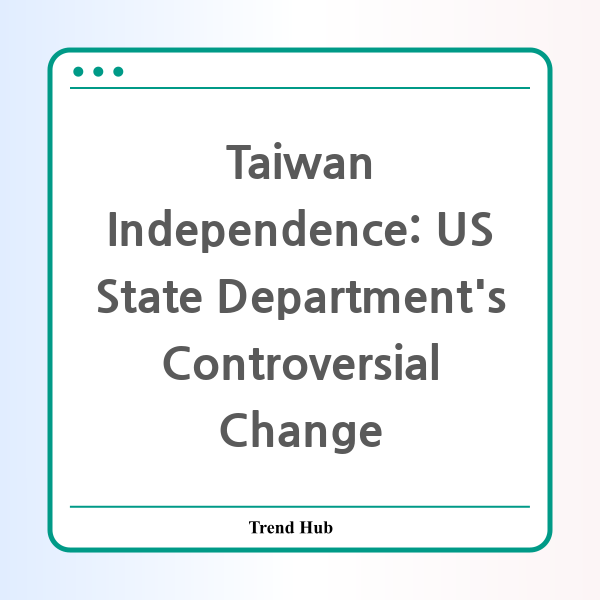* This website participates in the Amazon Affiliate Program and earns from qualifying purchases.

Have you heard about the latest shift in US foreign policy towards Taiwan? The recent removal of a key phrase from the US State Department's website regarding Taiwan's independence has shaken diplomatic waters, particularly with China. This seemingly minor update has sparked significant reactions and raised questions about the future of US-Taiwan relations.
The phrase "we do not support Taiwan independence" has been part of the US State Department's fact sheet on Taiwan for an extended period. However, during what the department described as a "routine update," this statement was eliminated. China's immediate response was one of condemnation, labeling the amendment as a "serious regression" in US policy. This sentiment reflects concerns about Washington's intentions and its commitment to the One China principle, which maintains that there is only one sovereign state under the name China, and that Taiwan is part of it.
Beijing's reaction indicates how pivotal Taiwan is in the geopolitical landscape. The Chinese government views Taiwan not just as a territory but as a vital part of its national integrity. The removal of the phrase was interpreted as signaling support for Taiwanese independence, a concept that is anathema to the Chinese Communist Party (CCP). A spokesperson for China vehemently urged the US to rectify what they termed as a mistake and adhere closely to its established policies regarding Taiwan.
In contrast, reactions from Taiwan were more positive. Taiwanese officials, including Foreign Minister Lin Chia-lung, expressed gratitude towards the US for what they described as "positive, Taiwan-friendly wordings." This perspective highlights the complex and often paradoxical nature of Taiwan’s international standing: while the island operates as a sovereign nation with its own government and democratic institutions, its formal recognition on the world stage is shadowed by the looming presence of China.
The US's commitment to Taiwan has traditionally been tenuous, caught between the desire to support a democratic ally and the need to manage relations with Beijing. By supporting Taiwan's membership in international organizations and recognizing its de facto independence, the US appears to be recalibrating its approach, particularly under the new foreign policy team of the Trump administration. As Secretary of State Marco Rubio—a staunch Taiwan supporter—takes helm, analysts speculate how these shifts might influence future US-China relations.
Interestingly, this is not the first time the State Department has revisited this language. In 2022, a similar removal occurred before the phrase was put back on the website shortly after. This pattern suggests a diplomatic tightrope that the US must walk, balancing between maintaining crucial ties with Taiwan while not provoking an already sensitive Beijing.
Furthermore, military dynamics add another layer to this complex issue. Recently, the US Navy has been active in the Taiwan Strait, with naval missions occurring that are sure to provoke China's ire. While the US maintains its stance of preserving peace and stability in the region, the military maneuvers only serve to heighten tensions. The Chinese military's response has been notably aggressive, warning that such actions could escalate security risks in the region.
This delicate situation illustrates how a simple change in wording can have far-reaching implications. The US's informal relationship with Taiwan has become a focal point for broader geopolitical strategies, particularly as China continues to assert its claim over the island. The unfolding narrative will be essential to watch as it could shape not only US-Taiwan relations but also the overall balance of power in the Asia-Pacific region.
For now, as the dust settles on this diplomatic maneuvering, it remains to be seen how both the US and Taiwanese governments will navigate the responses from Beijing. Will the US reinforce its commitment to Taiwan, or will it tread lightly to avoid further antagonizing China? Only time will tell, but one thing is clear: the issue of Taiwan independence remains a critical topic at the heart of US-China relations.
* This website participates in the Amazon Affiliate Program and earns from qualifying purchases.